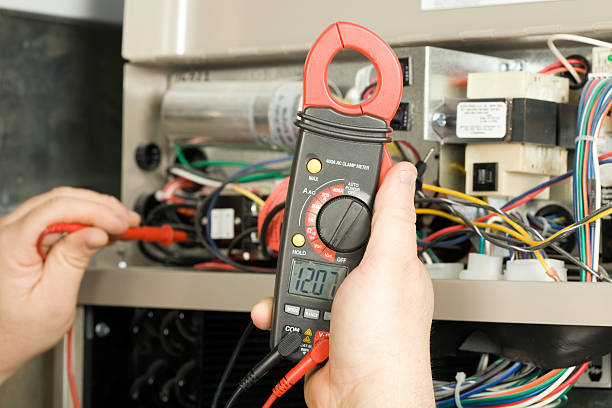
Virginia Beach AC Replacement: Your Guide to a Cooler Home
Don't let a struggling air conditioner leave you sweating through another Virginia Beach summer. At Ronald's Heating & Cooling, we understand that a reliable AC system isn't just a luxury—it's essential for comfort and well-being in our unique coastal climate. If your current system is failing to keep up, costing you more than it should, or frequently breaking down, it might be time to consider an AC replacement.
This guide reveals the crucial warning signs that indicate your air conditioning unit is ready for an upgrade, helping you make an informed decision before a small problem becomes a complete breakdown. Replacing an old, inefficient AC unit with a new, high-efficiency system can significantly improve your home comfort, reduce energy bills, and provide lasting peace of mind. Let Ronald's Heating & Cooling, your trusted local HVAC experts since 2006, help you identify the right time to invest in a superior cooling solution for your Virginia Beach home or business.
Is It Time for a New AC Unit? Top 5 Warning Signs
Knowing when to repair your air conditioner versus investing in a new AC installation can save you significant time, money, and discomfort. Here are the five key indicators that suggest your existing AC system is nearing the end of its life and a Virginia Beach AC replacement is your best long-term solution.
1. Uneven Cooling or No Cool Air
Experiencing inconsistent temperatures throughout your home, or worse, no cool air at all, is a primary red flag for AC failure. You might notice some rooms are perfectly chilled while others remain uncomfortably warm, even with your AC running constantly. This isn't just annoying; it signals a deeper problem within your cooling system.
Common Causes & When to Consider Replacement:
- Low Refrigerant Levels: While a recharge can provide temporary relief, persistent low levels indicate a leak that can be costly to repair, especially in older units using outdated refrigerants.
- Failing or Damaged Compressor: The compressor is the heart of your AC. If it's failing, repairs are often expensive, sometimes costing nearly as much as a new unit.
- Blocked or Damaged Ductwork: Issues here can reduce airflow, making your AC work harder and unevenly cool your space. Extensive duct repairs or replacement might be better paired with a new, more efficient AC unit.
- Aging System Components: Over time, the internal parts of your AC lose their ability to transfer heat efficiently. If your system is more than 10-15 years old, its struggle to cool effectively often means it's time for an upgrade rather than continuous repairs.
If these cooling issues persist despite maintenance, or if major components like the compressor are failing, opting for a new AC unit in Virginia Beach can restore consistent comfort and significantly improve energy performance.
2. Frequent Repairs Are Adding Up
While routine maintenance and occasional repairs are normal for any appliance, a pattern of recurring service calls for your air conditioner is a clear sign it's on its last legs. If you're scheduling repairs every season, or multiple times within a single summer, the cumulative cost can quickly approach or even exceed the investment in a new system.
Calculating the "Repair vs. Replace" Threshold:
- The 5,000 Rule: A common guideline suggests that if the cost of a repair multiplied by the age of the unit (in years) exceeds $5,000, it's generally more cost-effective to replace the system. For example, a $500 repair on an 11-year-old unit ($500 x 11 = $5,500) indicates replacement is likely the smarter choice.
- Half-Price Rule: If the total cost of recent repairs is approaching half the price of a brand-new AC installation, it's time to consider an upgrade.
Continuous fixes suggest that underlying wear and tear is widespread across multiple components, not just an isolated issue. Investing in a new AC system now can save you from future breakdowns, unexpected expenses, and the frustration of a constantly unreliable unit.
3. Rising Energy Bills With No Explanation
Have your electricity bills been steadily climbing, even when your cooling habits haven't changed? An unexplained surge in energy consumption points directly to a declining AC efficiency. As air conditioners age, their internal components wear out, forcing the system to work harder and consume more power to achieve the same level of cooling.
Why Your AC Becomes an Energy Hog:
- Worn Motors & Blowers: These components become less efficient, drawing more electricity to move air.
- Dirty Coils: Accumulation of dirt and debris on evaporator and condenser coils hinders heat exchange, forcing the compressor to run longer.
- Low or Leaking Refrigerant: When refrigerant levels are low, the system struggles to absorb and release heat, leading to extended run times.
Modern, energy-efficient AC units, especially those with high SEER (Seasonal Energy Efficiency Ratio) ratings, are designed to deliver superior cooling while significantly reducing your monthly utility costs. The initial investment in an AC replacement in Virginia Beach can be quickly offset by substantial long-term energy savings.
4. Unusual Sounds and Odors from Your AC
Your air conditioner should operate quietly, with only the gentle hum of the fan. Any new or strange noises, such as grinding, rattling, squealing, buzzing, or hissing, are clear indicators of mechanical distress. Similarly, foul odors emanating from your vents should never be ignored.
Decoding the Sounds and Smells:
- Grinding/Rattling: Often points to loose components, a failing motor bearing, or an issue with the fan blades.
- Squealing: May indicate a worn-out fan belt or a struggling motor.
- Hissing/Bubbling: Can signal a refrigerant leak, which impacts efficiency and can be harmful.
- Burning Smell: A serious red flag, potentially indicating overheating wires, a burning motor, or damaged insulation.
- Musty/Mildew Odor: Suggests moisture problems, mold growth within the unit, or dirty ductwork, affecting indoor air quality.
While some noises or smells might be minor, persistent or severe issues often signify that the entire system is under stress. A comprehensive evaluation by an HVAC professional can determine if these issues are repairable or if the unit is too far gone, making an AC replacement a safer and more reliable option.
5. How AC Age Impacts Performance
Most air conditioning units have a lifespan of 10 to 15 years. If your AC system is older than 10 years, it's likely operating less efficiently than newer models and is more prone to breakdowns. Even if it still seems to be working, an aging system can be a silent drain on your wallet and your comfort.
Signs Your AC's Age is Showing:
- Decreased Efficiency: Older units were built to lower SEER standards and will inherently use more energy than today's high-efficiency models.
- Outdated Refrigerant: Many older systems use R-22 refrigerant, which is being phased out due to environmental concerns. Replenishing or repairing systems with R-22 is becoming increasingly expensive and difficult.
- Frequent Breakdowns: As components naturally wear down, the likelihood of needing repairs increases significantly with age.
- Inability to Meet Demand: An old AC might struggle to maintain comfortable temperatures during peak Virginia Beach summer heat waves.
Upgrading to a new, energy-efficient AC system not only ensures superior cooling performance but also provides access to modern features, quieter operation, and significantly lower operating costs over its lifespan. It's a proactive step to avoid emergency replacements and enhance your home's value.
Your Proactive Step Towards Ultimate Comfort
If your air conditioner exhibits one or more of these critical warning signs, it's a strong indication that merely patching up problems isn't the most economical or reliable solution. Continuous repairs, soaring energy bills, and inconsistent comfort are not minor inconveniences—they're clear signals your cooling system is nearing its retirement.
Don't wait for your AC to fail completely during the peak of summer, leaving you in a hot, uncomfortable situation. Taking a proactive approach to AC replacement in Virginia Beach can bring you lasting peace of mind, consistent home comfort, and significant savings on future energy bills and repair costs.
At Ronald's Heating & Cooling, we specialize in expert HVAC replacement services for both residential and light commercial properties in Virginia Beach, Norfolk, Portsmouth, and Chesapeake. Our professional team provides free, no-obligation estimates to help you understand your options and choose the perfect energy-efficient solution for your unique needs and budget. We also offer flexible financing options through trusted partners like GoodLeap and Wells Fargo.
Ready to restore comfort and efficiency to your home with a reliable, new AC system? Contact Ronald's Heating & Cooling today to schedule your free estimate and take the first step towards a cooler, more comfortable Virginia Beach summer.









